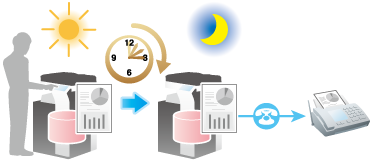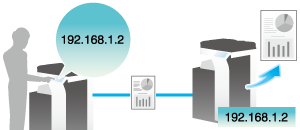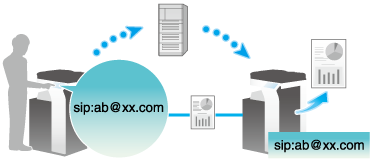
To Reduce the Fax Communication Cost
Sending a fax during a time period that incurs lower communication expenses (Timer TX)
Timer TX is a function that automatically starts a communication at the pre-specified time. Sending a fax for phone bill discount rate hours during early-morning or late-evening, for example, reduces communication expenses.
For details, refer to Specifying the Time for Communication ([Timer TX]).

Broadcasting a fax via a relay station (Relay Distribution)
The Relay Distribution function distributes a fax to a relay machine and have the relay machine distribute the received fax to the pre-registered destinations. Overall communication costs can be reduced by grouping relay stations and destinations by area, compared to the case in which faxes are broadcast to all destinations. This function is useful when broadcasting faxes to distant locations.
For details, refer to Sending after Specifying a Relay Machine ([F-Code TX]).

Using the Internet fax function for communication
Internet fax is a function that sends and receives faxes via an intranet or the Internet. This function uses the same network as a computer, offering lower communication expenses than those incurred for normal fax transmission. It also reduces communication expenses regardless of the number of fax pages or the distance to a destination.
For details, refer to Sending and Receiving an Internet Fax.

Using the IP address fax function for communication
IP Address Fax is a function that sends and receives faxes within a limited network such as an intranet. This function uses the same network as a computer, offering lower communication expenses than those incurred for normal fax transmission. Use of an intranet helps to reduce communication costs.
For details, refer to Sending and Receiving an IP Address Fax.

Using the IP fax (SIP) function for communication
IP fax (SIP) is a function that enables the real-time sending/receiving via the intranet and Internet. This function provides a low cost and low latency communication even when sending/receiving a fax to/from remote locations.
For details, refer to Sending and Receiving an IP Fax (SIP).

 in the upper-right of a page, it turns into
in the upper-right of a page, it turns into  and is registered as a bookmark.
and is registered as a bookmark.